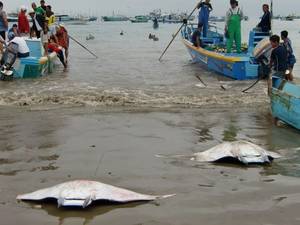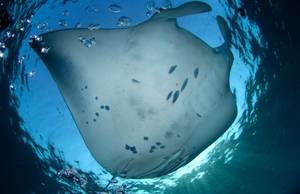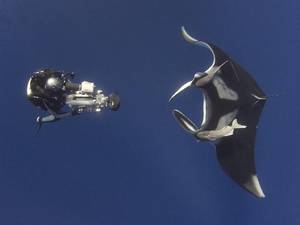Manta Ray Ecotourism
Interview with
Andrea - Manta rays are caught across the globe. But when people imagine a manta ray fishery sometimes they don't quite understand the different types of fisheries that occur.
 Obviously there are subsistence or artisanal fisheries that occur throughout their distribution where indigenous populations have been targeting them for food for many, many years. And that's not something that we're as worried about because those are sort of historical, traditional fisheries and a lot of times they catch animals in small numbers.
Obviously there are subsistence or artisanal fisheries that occur throughout their distribution where indigenous populations have been targeting them for food for many, many years. And that's not something that we're as worried about because those are sort of historical, traditional fisheries and a lot of times they catch animals in small numbers.
And then obviously you get bycatch fisheries that are also very, it's a very contentious issue because obviously the world needs to eat and there's fisheries for food that's caught around the globe. And unfortunately people are not catching sometimes in a sustainable way, and a lot of other animals die as bycatch. And for some reason manta rays seem to get caught up on nets when people are targeting things like tuna or whatnot.
People are not trying to catch the mantas and they're actually quite aware that you shouldn't be targeting mantas at all but there's not anything that they feel that they can do about it.
So, a lot of these traditional fisheries in places like Indonesia, or places like Taiwan, or even in India, they're catching large, large amounts of these mantas and mobulas in these nets which is disastrous to any of those populations.
Clearly the thing that we're most concerned with is target fisheries, places where people are actually targeting manta rays specifically because they are trying to extract the gill rakers from the animals to sell to the Chinese medicinal trade market.
And that is, I think, the most abominable use of mantas at the present time ,which is, you know, they're not using them for food or anything, they're actually targeting them for medicinal products that actually don't work. And I actually feel that's probably where we need to target most of our energy at the moment is trying to stop those fisheries.
Helen - And where in the world are mantas being targeted for their gills?
Andrea - Manta fisheries are springing up particulary in Southeast Asia. Some of the worst I've ever seen are in places like Indonesia where, you know, we've seen as many as 500 mantas a year were being taken from some of the fisheries in places like Lombok.
But we're also seeing that it's starting to spread to areas like India and Sri Lanka. Even across the places like Africa where local fisherman are now being told they can get large sums of money for taking these animals.
Helen - I guess a lot of conservationists feel that we should really be talking about providing alternatives for people who would like to make money from say fishing spcies like manta rays and ecotourism is something that's often put forwards as a possible alternative. Do you think we can make manta tourism work?
 Andrea - This is probably one of the closest issues to my own heart because, you know, I do, you know, the majority of my research is done in Mozambique which is a coastline that is very, still undiscovered, still very pristine. So in the time, almost the decade I've been working in Mozambique I've actually started to see tourism on the rise in the area.
Andrea - This is probably one of the closest issues to my own heart because, you know, I do, you know, the majority of my research is done in Mozambique which is a coastline that is very, still undiscovered, still very pristine. So in the time, almost the decade I've been working in Mozambique I've actually started to see tourism on the rise in the area.
Fundamentally tourism can be a very positive influence especially when trying to make governments understand the value of animals and also see an alternative to fishing. So if you can show them that by sustainably using, you know, resources like their ocean resources to promote tourism in a sustainable way, then you can really, sort of, provoke change.
However, the actual tourism itself needs to also be done slowly and sustainably in a way that doesn't change the animal's behaviour.
And even in a place like Mozambique where tourism is just budding, we're actually starting to see a shift in animal behaviour already. And I know that many other people around the world specifically with manta rays have actually seen a negative response from too much tourism, you know, tourism that increases too quickly and lots of human traffic on the reef that's actually changing the behaviour of the mantas.
So I'm definitely encouraging people that want to promote tourism in their area for mantas as an alternative for fishing, to develop codes of conduct, to you know make sure that people are diving responsibly, and actually be very conscious of slow growth, you know, not expanding too quickly, not having too much human traffic, and actually using science, using biologists as a way to investigate how you can make it sustainable.
 Like, one of the things that we've noticed in Mozambique is that people are actually diving with mantas at cleaning stations, and cleaning stations appear to be very critical habitat for mantas, but mantas only use them during the daytime hours. And in fact they seem to only use them from 7 o'clock in the morning to about 2 o'clock in the afternoon. Those are the exact same hours that divers are actually wanting to go on dives.
Like, one of the things that we've noticed in Mozambique is that people are actually diving with mantas at cleaning stations, and cleaning stations appear to be very critical habitat for mantas, but mantas only use them during the daytime hours. And in fact they seem to only use them from 7 o'clock in the morning to about 2 o'clock in the afternoon. Those are the exact same hours that divers are actually wanting to go on dives.
So actually if you have divers constantly on the reef during those hours mantas are getting no reprieve, no private time on the cleaning stations at all.
So it's been a suggestion of mine in Mozambique that if we're going to continue diving at these critical habitats with mantas that they do for a few hours in the morning and make sure for the rest of the day there's no diving allowed on the reef so that the mantas are getting a little bit of a reprieve from human traffic.
So I definitely think it's important to work with scientists to actually examine the behaviour of the animal so that you can modify, sort of, the diver behaviour to limit the impact.
So it's really, really important for everyone to work together and that's something that you don't often see around the world. Sometimes you get the tourism operations working against scientists because they feel that they have dissimilar objectives, but they actually have similar objectives, which is protecting animals and making sure it's a sustainable industry.
Find out More
Foundation for the Protection of Marine Megafauna









Comments
Add a comment